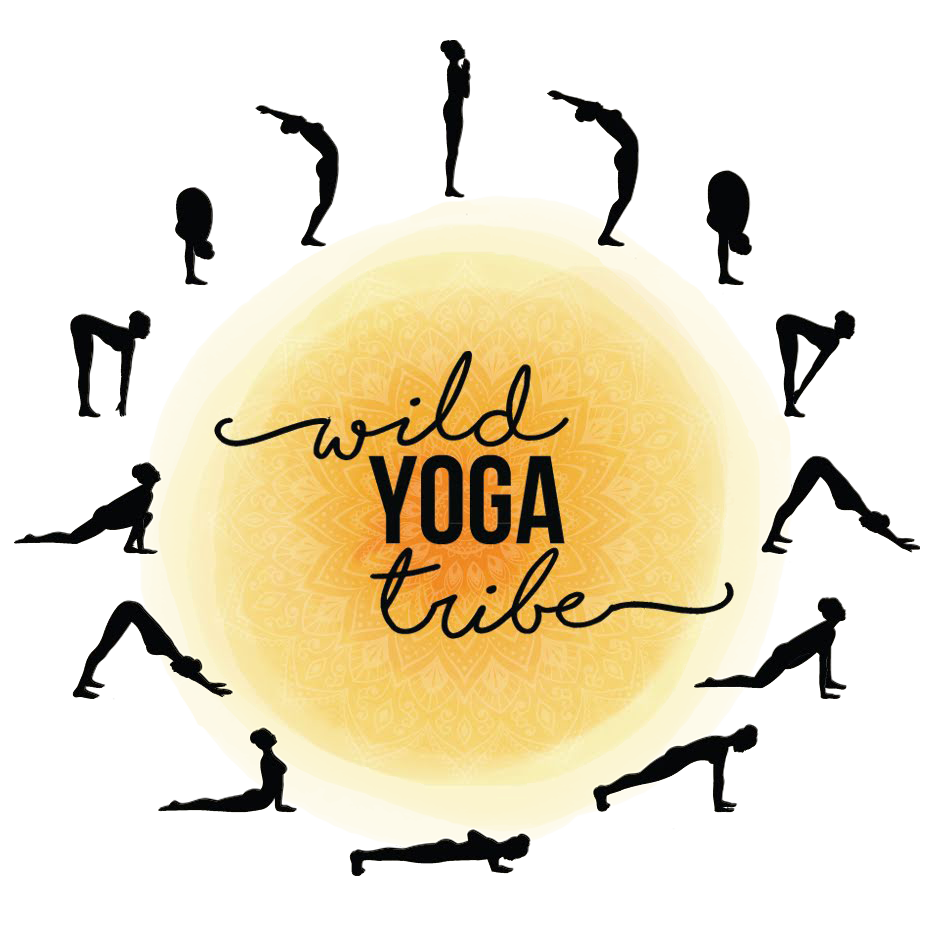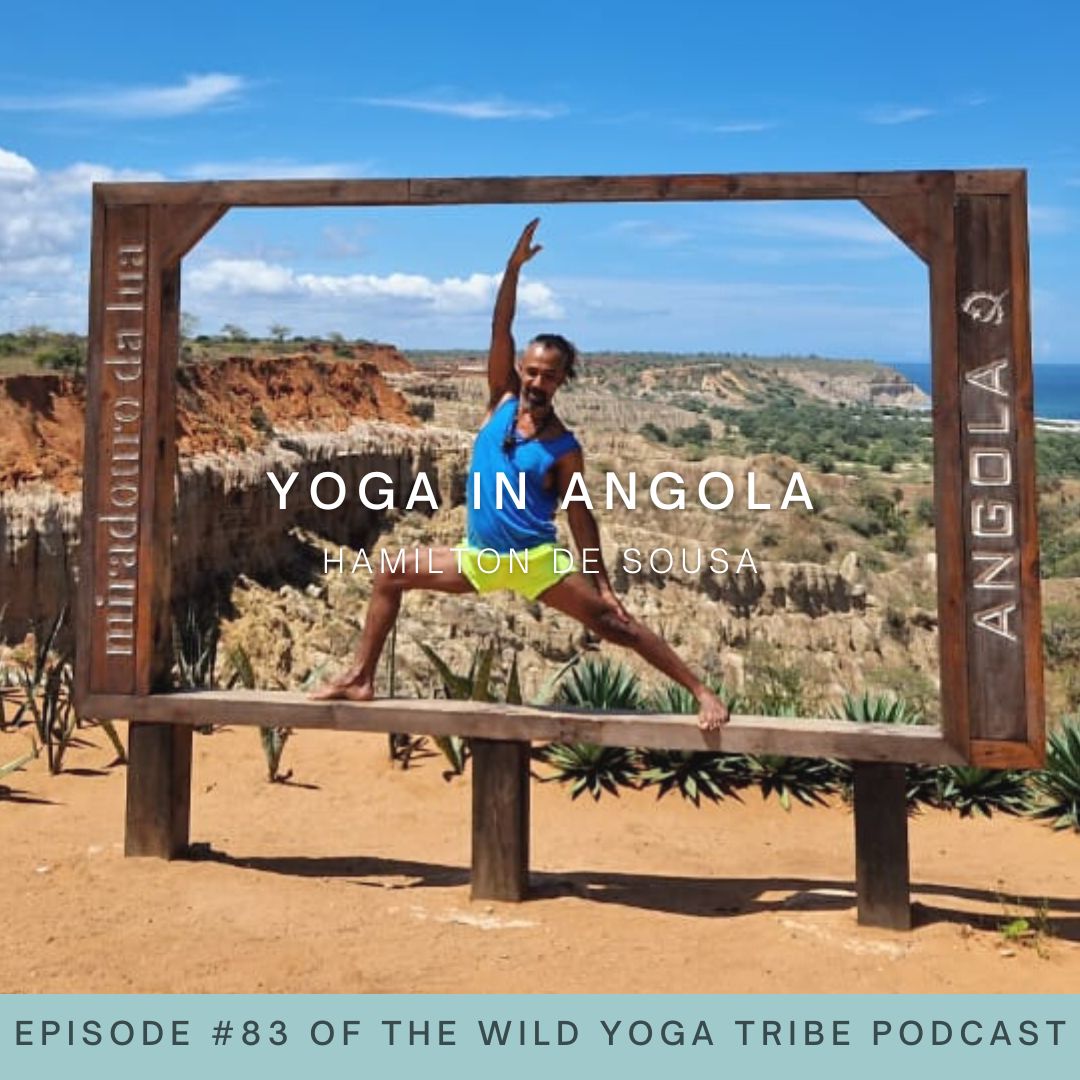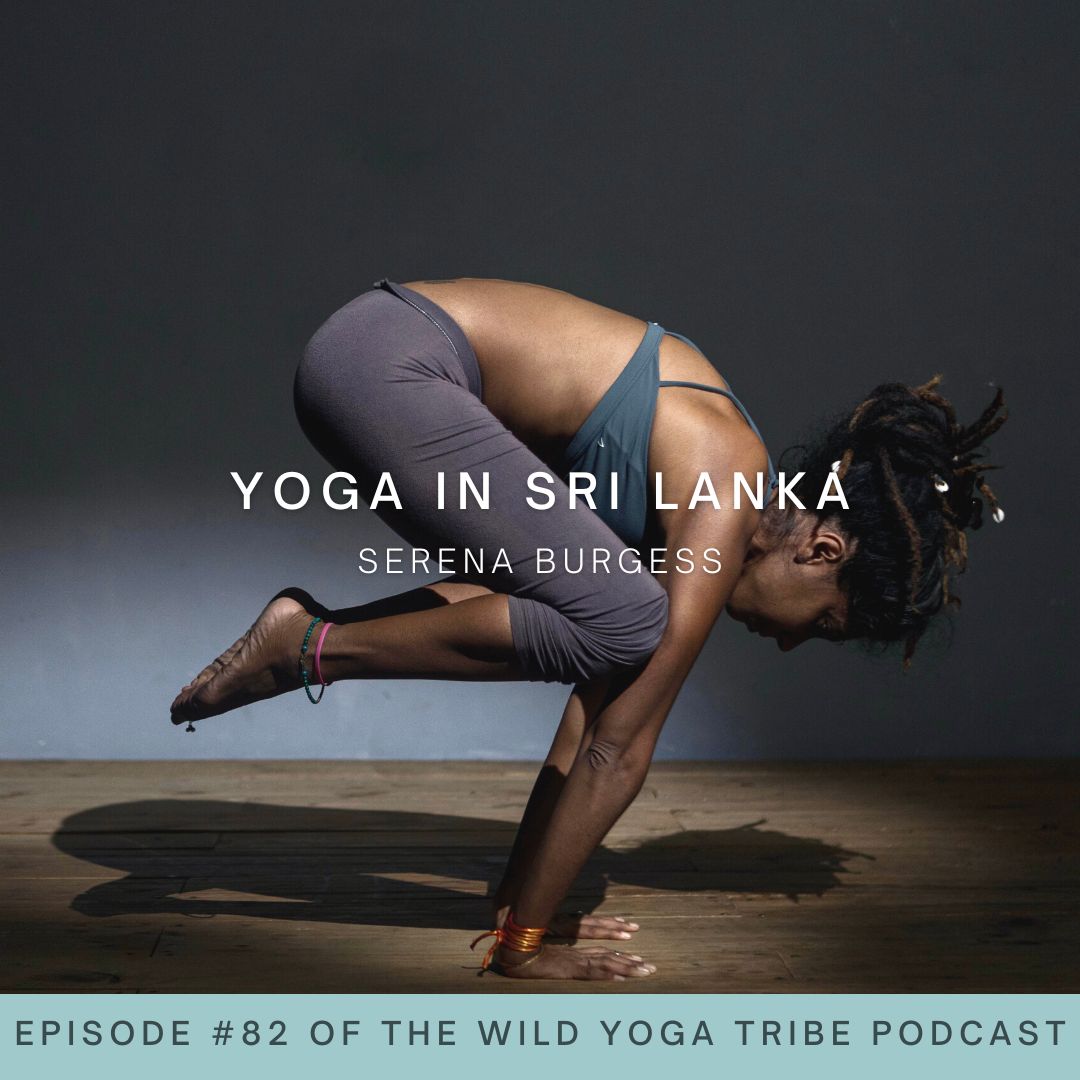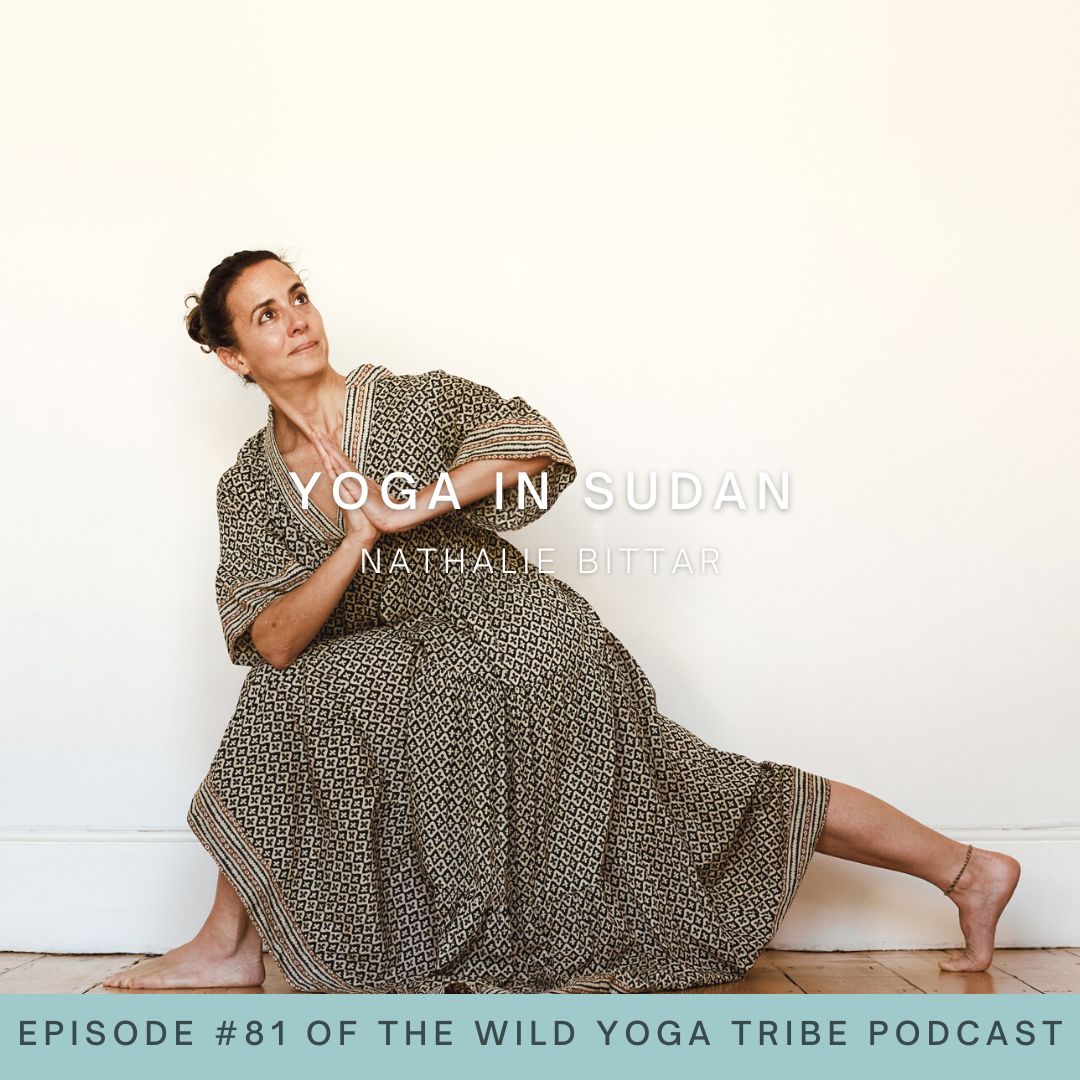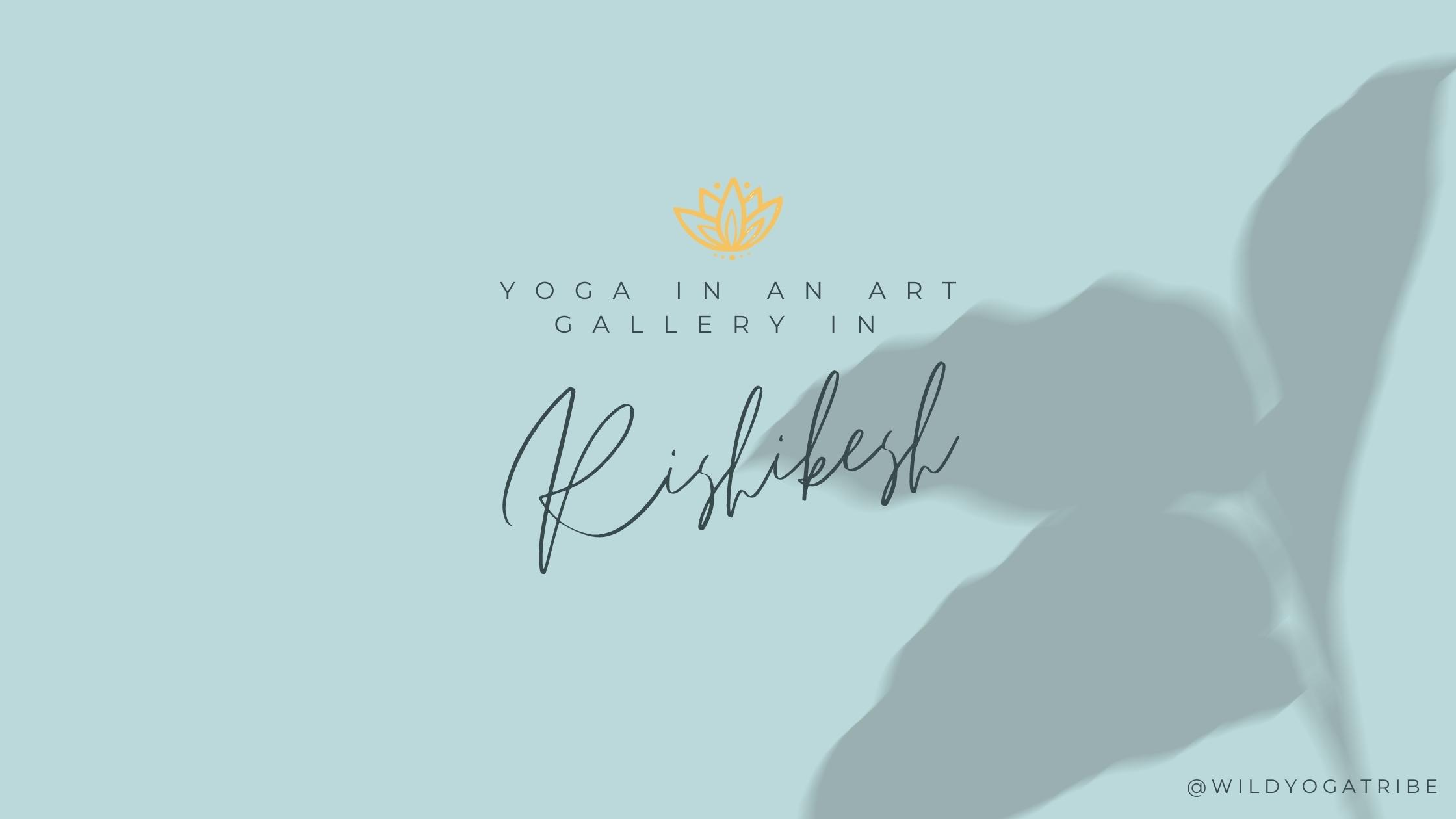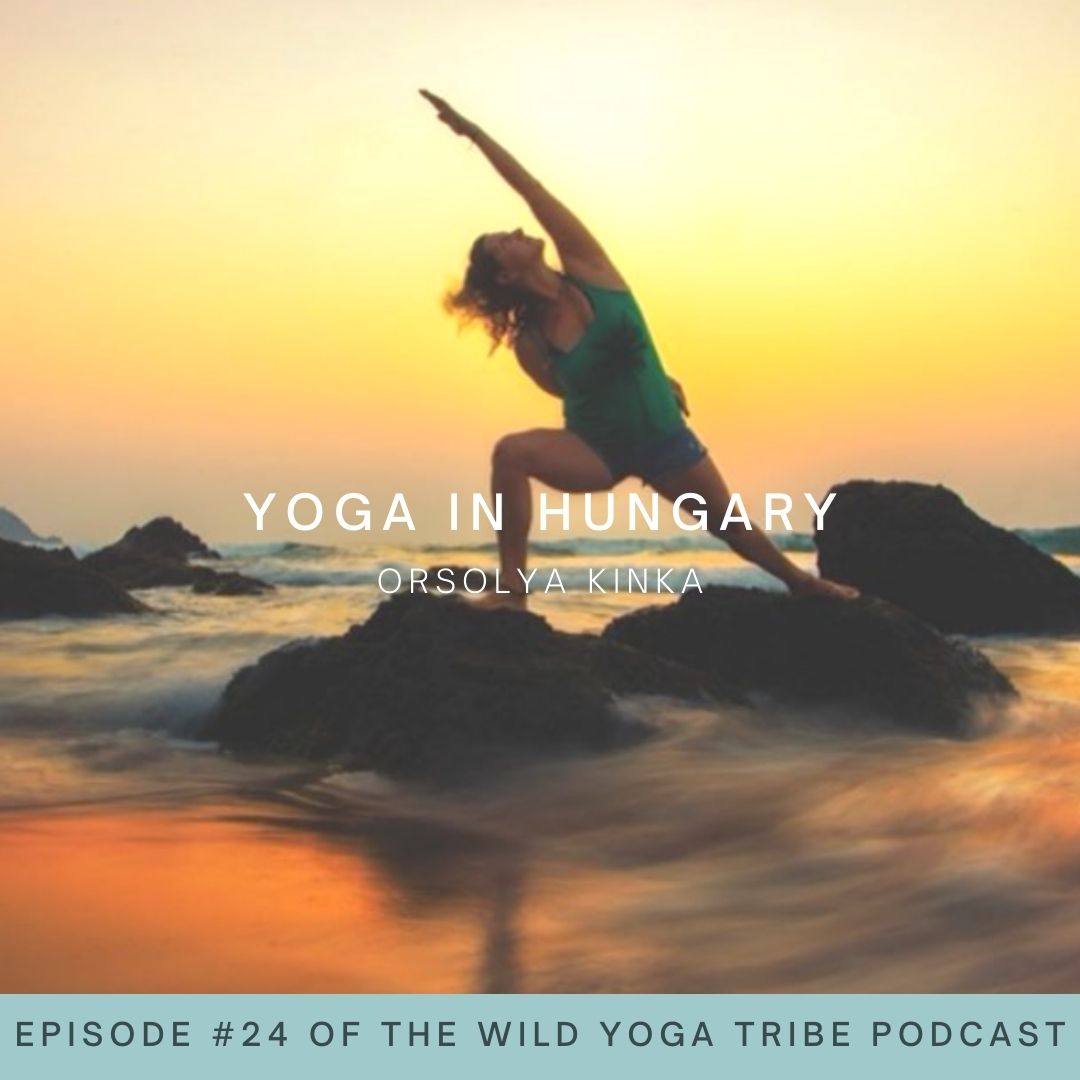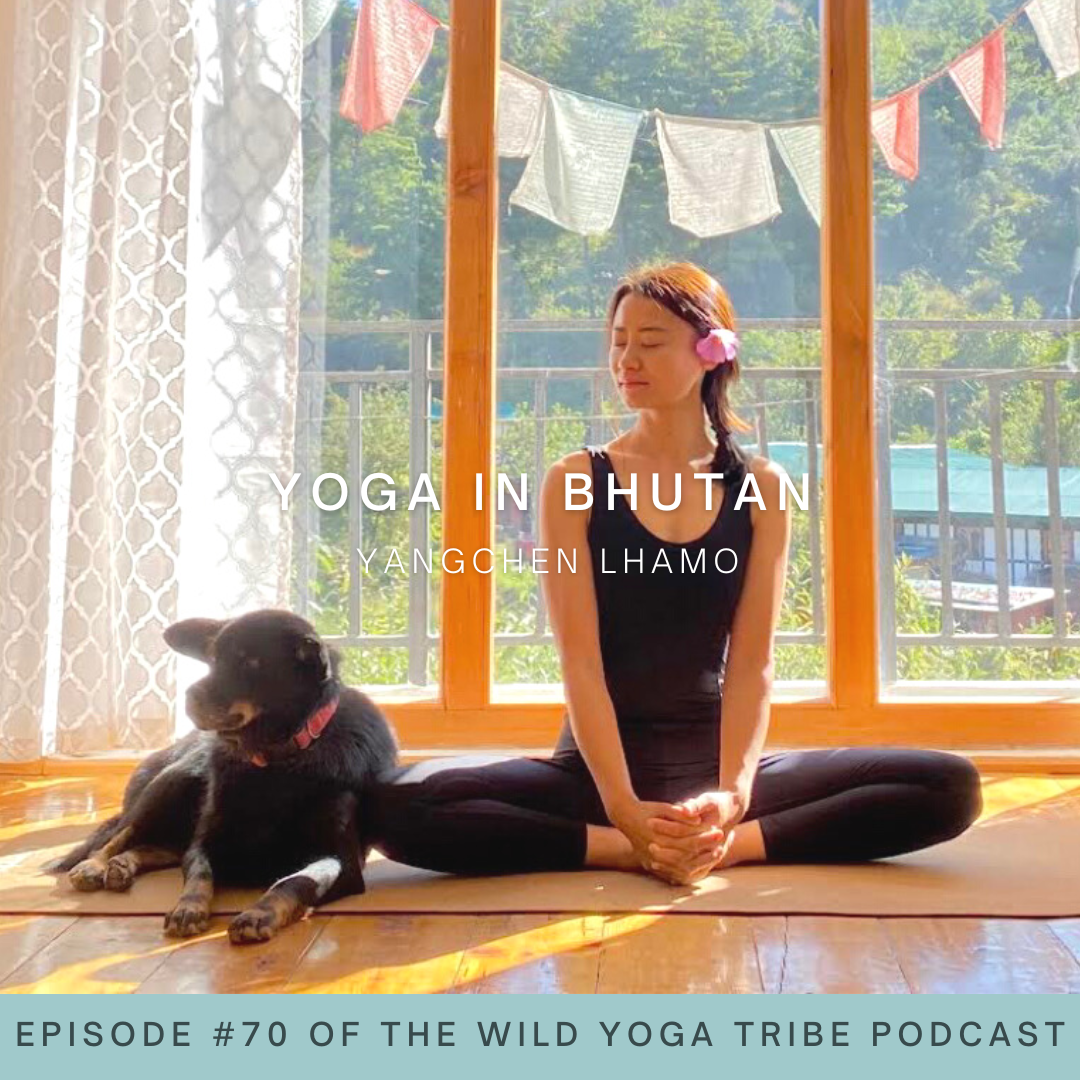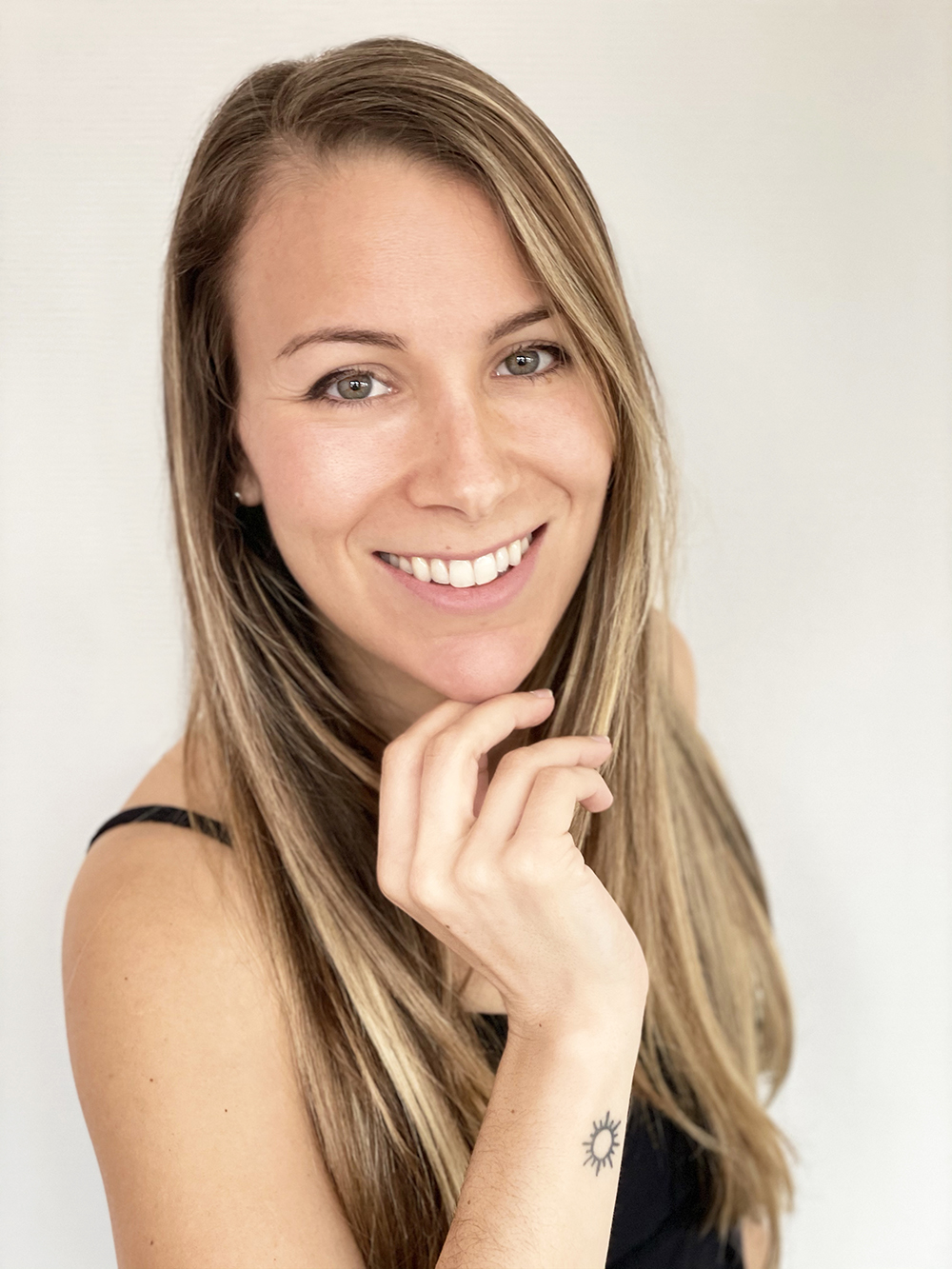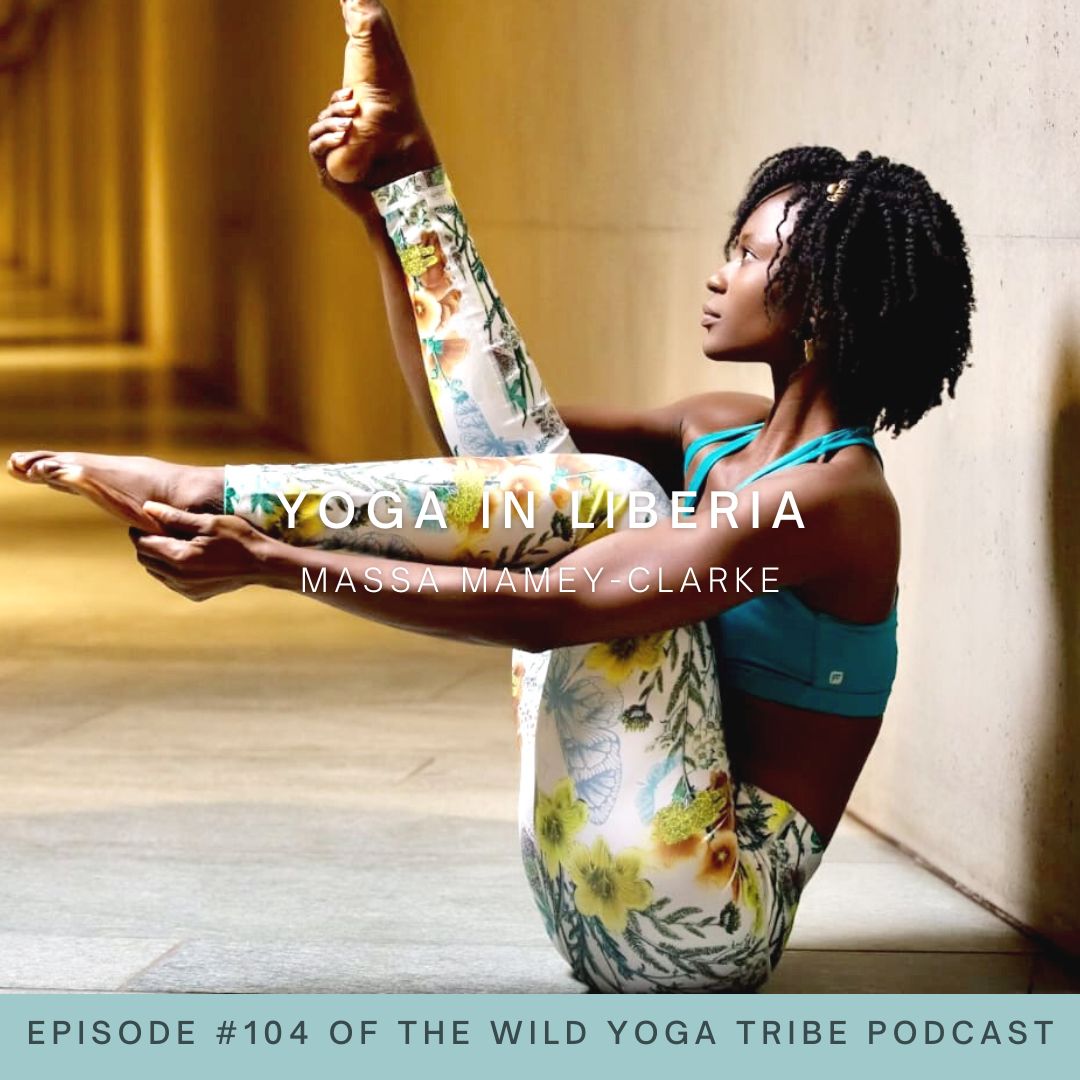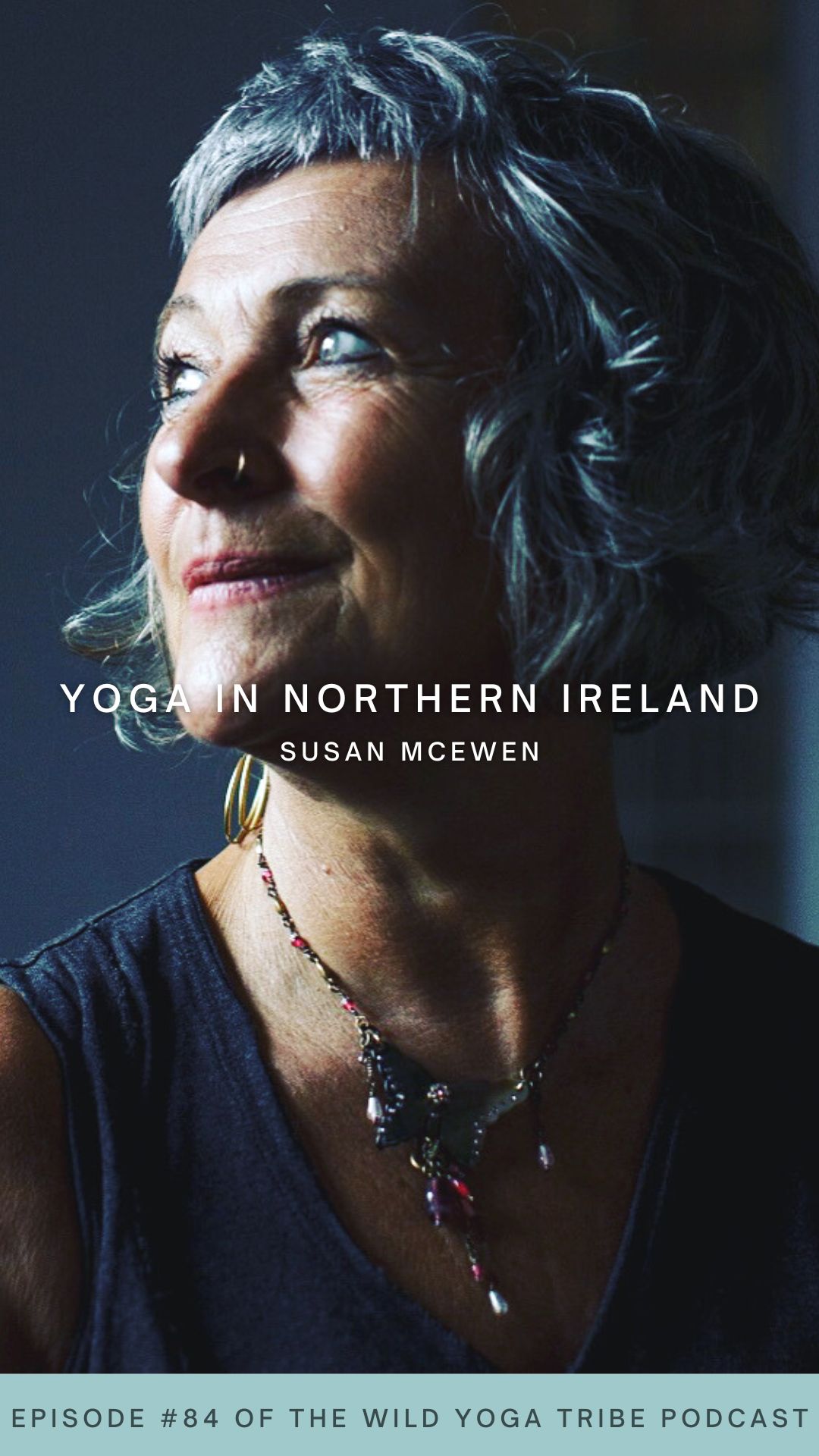
EPISODE #84 – YOGA IN NORTHERN IRELAND
Meet Susan McEwen
Meet Susan McEwen a yoga teacher from Northern Ireland who is living and breathing peace and reconciliation into her yoga studio and into her community. Welcome to yoga in Northern Ireland!
Wild Yoga Tribe Podcast Episode #84 – Peace and Reconciliation – Yoga in Northern Ireland with Susan McEwen
Welcome to Episode #84 of the Wild Yoga Tribe Podcast! My conversation with Susan McEwen, a yoga teacher from Northern Ireland, was powerful as we took a deep dive into huge issues like peace, injustice, reconciliation, racism, religion, as they relate to yoga and to Northern Ireland.
I hope that this conversation opened your eyes to new perceptions, conceptions, and the need to investigate misconceptions around yoga.
If you’re looking to tune into a podcast episode that is all about yoga in Northern Ireland then this is the conversation for you.
Tell me more about Susan McEwen
Susan McEwen is a yoga studio co-owner in Northern Ireland, in Belfast, of Yoga Quarter. Susan and two of her friends opened the studio just a few months after Susan competed her first 200-hour yoga teacher training. Susan loves learning and has also completed 100-hour Yin Training, as well as training in trauma-informed yoga with Hala Khouri and Yoga for Social Justice with Yoga For Humankind. Susan teaches Vinyasa and Yin regularly at her own studio. Additionally, she teaches in a yoga teacher training and has just developed a course called Radical, which looks at the container of yoga to explore social justice and trauma. Susan developed this course along with two of her yoga teachers.
What to expect in the Yoga In Northern Ireland episode of the Wild Yoga Tribe Podcast
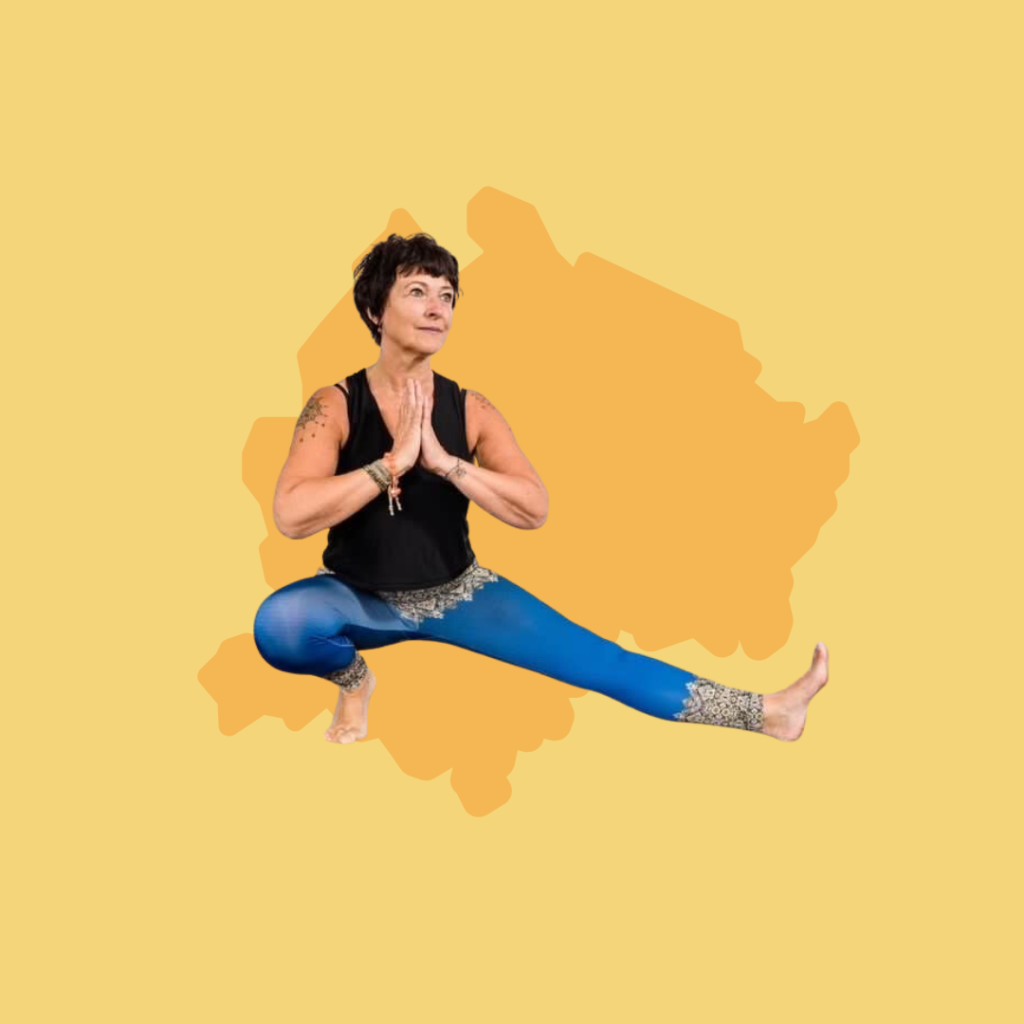 Susan McEwen is a Belfast-based yoga teacher who encourages inclusivity and understanding of differences, particularly in a community like Belfast, Northern Ireland, where sectarianism persists. She stresses the importance of understanding the impact of difference and avoiding spiritual bypassing. Susan McEwen is also involved in social justice through yoga and highlights the ongoing work that needs to be done to address the violence that persists in society.
Susan McEwen is a Belfast-based yoga teacher who encourages inclusivity and understanding of differences, particularly in a community like Belfast, Northern Ireland, where sectarianism persists. She stresses the importance of understanding the impact of difference and avoiding spiritual bypassing. Susan McEwen is also involved in social justice through yoga and highlights the ongoing work that needs to be done to address the violence that persists in society.
Susan’s advice to yoga teachers who want to open their own studio is to start small and work with like-minded people. McEwen describes yoga as an unfolding and inhabiting of the present moment, encompassing all aspects of one’s being with challenge and acceptance.
In addition to her yoga practice, Susan is involved in promoting social justice through yoga and working to create change in her community. She emphasizes the importance of grassroots communities coming together and acknowledges the growing sense of poverty and scarcity, which is contributing to anxiety and mental health issues. Overall, Susan’s message is one of inclusivity, acceptance, and community building through yoga.
Favorite Quote From Susan McEwen
“People have this idea I think that yogis are all happy-clappy, hippie-dippies. And yet I feel that the people who are coming to the studio at the moment and really are coming because they’re coming anxious, they’re coming, wanting community, they’re coming wanting relaxation and rest, they’re coming wanting to, release something out of their body.”
What’s in the Yoga in Northern Ireland?
Feel like skimming?
Working for peace and reconciliation
Creating the possibility of change on your doorstop
Be careful of spiritual bypassing
Is Vinyasa a Western re-styling of yoga?
Yoga and Celtic traditions
Connect with Susan McEwen
https://www.facebook.com/yogaquarter
https://www.instagram.com/yogaquarter/
People Mentioned:
Support the podcast:
https://www.patreon.com/wildyogatribe
Want more?
https://wildyogatribe.com/thepodcast/
Everything you need is just one click away! Check out all the resources here: https://linktr.ee/wildyogatribe
PODCAST TRANSCRIPTION
Read + Reflect + Respond
Wild Yoga Tribe #84 – Yoga in Belfast with Susan McEwen Transcription
[00:00:00] Lily Allen-Duenas: Namaste family and welcome back to the Wild Yoga Tribe Podcas!t Today I am so excited to welcome Susan McEwen onto the show today. She’s a yoga teacher and a co-owner of a yoga studio in Belfast called Yoga Quarter. Susan and two of her friends opened the studio just a few months after Susan completed her 200 hour yoga teacher training, which I love to celebrate and I have questions about, and this is so exciting to me that she did open that up so recently, or so soon after her yoga teacher training.
So Susan continued learning and continued to complete a 100 hour yin training, more 200 hour trainings and a trauma informed yoga. Certification with Hala Khouri and the yoga and Social Justice with yoga for humankind. Susan teaches Vinyasa and Yin regularly at her own studio, and she also teaches a yoga teacher training and has developed a course called Radical, which looks at the container of yoga to explore social justice and trauma.
She developed this course along with two of her yoga teachers, and I’m excited to hear more. So thank you so much, Susan, for being with us on the show today.
[00:01:17] Susan McEwen: I am very excited to speak with you.
[00:01:19] Lily Allen-Duenas: Wonderful. So just to get started, tell us a little bit more about you and your journey and how yoga came into your life.
How Did Yoga Come Into Your Life?
[00:01:27] Susan McEwen: Yeah, so I started practicing yoga, I think [00:01:30] back in about 2000, 2001, but at that stage, it was very old school, very retro. So I had a friend come around first thing in the morning and she brought with her a DVD and it showed like a course, like a practice. And I had no idea what type of yoga I was doing. I had no idea, but I knew that I felt better afterwards. And then a few months after that, and I was doing some work in my previous career. I worked in peace and reconciliation in North Ireland.
As part of one of the courses I was doing, there was somebody who started the day with yoga. And so I started practicing in person at that stage and was told that the type of practice that I was doing was Hatha. And I suppose from there on my journey just grew and grew. And I really stayed with Hathga Yoga for the first maybe six or seven years. I didn’t know that at the time. I have to reiterate. And then in 2008, my dad died and I suddenly realized that I was going to yoga and I was grieving on the mat. It was like it’s one week after his death, two weeks after his death.
And that continued and it suddenly became a very different experience. And I think from then on in, I didn’t need to put a label on it. What type of yoga? I was doing something that helped me do life better. Shortly after that, I find a very dear friend of mine who also [00:03:00] has a studio here in North Maryland. She opened a studio in Belfast and I started attending her classes. And that was when I was really introduced to Vinyasa. And I really enjoyed the fluidity of that. I enjoyed the movement of it, I enjoyed the creativity of it, and that really has become my main movement based practice over the last number of years.
[00:03:21] Lily Allen-Duenas: Oh that’s amazing! And so I know some of our listeners are yoga teachers. Maybe they dream of opening their own yoga studio, or maybe they don’t, or maybe they have their own studio. We have the whole gamut represented. But I love that you opened your yoga studio. You were brave, and you did that with a few friends, right? After completing your 200 hour training, can you tell us a bit how that happened and maybe some tips or advice or challenges that you.
What was Opening Your Yoga Studio in Belfast Like? Advice for Yoga Teachers Who Want to Open Their Own Yoga Studio.
[00:03:49] Susan McEwen: Yeah I’m sure most people who are listening to this will be familiar with the writer, Elizabeth Gilbert. She’s probably best known for Eat Pray Love, but she also did a podcast similar to this, actually just a conversation between two women with a person called Krista Tippett on another podcast called On Being.
And I listened to that back in 2016, and I was just going through quite a difficult time in my life, but I was just about to start my 200 hours, my first 200 hours. And what Elizabeth Gilbert introduces there is the concept that ideas don’t belong to anybody. That ideas belong only to themselves that they [00:04:30] exist. And what they’re looking for is collaborators, people to bring those ideas into being.
And that I have this kinda like little image. She described that ideas visit us. I have an idea of it like sitting on my shoulder and they visit each of us and they whisper in our ear. And we often say to people, I have an idea as though it’s our idea. And we talk about it and talk about it. And the idea gives a period of time to talk about it and says they’re not gonna do anything with it. And it goes and sits in somebody else’s shoulder and then they go ahead and do it. And I’m sure many of us have had that experience where we see something happening and we go, “Oh, that was my idea. I wish I’d gone and done it!” And what Elizabeth Gilbert suggests is that it was never our idea to start with that ideas want to be born, they want to be brought into the earth, into being, and they’re looking for collaborators.
So early on in my 200 hours, my first one, with a beautiful studio here in Belfast, it doesn’t actually exist anymore, but it was called Flow, I had this idea that I wanted to create or curate a yoga studio, yoga community on my own doorstep. I had been used to traveling for work traveling… my place of work was about like 90 minutes, two hours away, and then I’d also traveled internationally and in Peace and Reconciliation.
And I really at that stage wanted to be able to walk to work. And I live in quite a vibrant little neighborhood. About three miles outside Belfast City Center. [00:06:00] But like Belfast is tiny. So if you can imagine three miles is actually quite a different neighborhood. And I thought this community would just welcome a yoga studio. And the idea kept growing. And I talked with somebody else who was doing my course, who then became one of my business partners, and then another dear friend that I’d known for quite some time. And the thing that kept me going, was that the area that I live, the area that Yoga Quarter is in, it’s called Bally Hackamore in East Belfast.
Somebody else was going to open a studio here because it had to happen. It’s that kind of little community and that if I hadn’t, I would’ve been kicking myself. And it’s on my doorstep. So I think that energy just grew and I knew that to do that I needed to bring a team around me. So that’s why I did it with two other people.
And then I sought out other teachers, some of whom came through the teacher training with me and others were much more experienced as teachers. And very quickly we grew this little tiny studio that has just blossomed. Obviously it struggled during the pandemic, but it’s picked up since then.
And I have like maybe 30 classes in the studio every week. We have, some classes are quiet, some classes are absolutely packed. But we have this beautiful yoga community that are full. It’s quite diverse in terms of age range, in terms of ability, [00:07:30] and I feel that it was an idea that was going to happen and I just feel very honored that I was able to make it happen.
Elizabeth Gilbert and Krista Tippett
[00:07:36] Lily Allen-Duenas: I love that so much and I’m also grateful that you mentioned Elizabeth Gilbert and Krisa Tippett. Krisa Tippett, the most powerful episode I’ve heard of hers that when she. Is being interviewed was on Jonathan Fields’ podcast, the Good Life Project, and the whole premise is interviewing people about how to live a good life.
And Krista’s interview, like she said, something in there that blew my mind. I like wrote it on a post-it note. Then I printed it out in a pretty way doing my graphic design stuff. And I had it on my bathroom wall for a year. Like I just feel that there are so many powerful gifts that those two women have given us through their intelligence, their wisdom, their insights, and so I’m grateful that you mentioned both of them.
And Elizabeth Gilbert, I love her book, Big Magic on Creativity. I also think I got a lot of good goodness out of that as well.
Non-Grasping & Yoga Philosophy
[00:08:31] Susan McEwen: Yeah, and I think she mentions the ideas in that book as well. I think I went on to read that. Yeah, and I love that and I feel it really resonates with the yoga philosophy, like Patanjali’s Sutras as well, whereby we don’t grasp and, we don’t hold something tight, that we do something with that sense of, we do it without being overly attached to it.
And I feel that is, very countercultural today. My understanding, my experience, people are very much encouraged [00:09:00] to think of things as being theirs. As taking it, as opposed to know I am collaborating with an idea, I’m collaborating with community here. I’m curating something here. So I feel that it really sits well with the wider yoga philosophy as well.
[00:09:15] Lily Allen-Duenas: Oh, absolutely. So Susan, another question. I know we’re talking. This amazing gift you gave to your community, and you are responding to this idea and knowing that there’s a yoga studio that’s meant to exist in your neighborhood. And I’m wondering too though, who are your yoga teachers?
Who are Your Yoga Teachers?
[00:09:33] Susan McEwen: Oh, great question. So my very first yoga teacher who I still hold in such high regard, he was, who introduced me to Hatha, not just the DVD, but in person is a yoga teacher called Paul Harnett here in Belfast. Just a little bit of background there cuz it’s actually a really nice story.
Oh way, way back in the, early nineties, at that stage I was a single mom with three kids and my exercise passion at that stage it came about through aerobics and step, and Paul was my teacher then. And then it was later. So fast forward to about 2004 and I just happened to hear through the grapevine, Belfast is a very small place, that he had transitioned from just teaching aerobics and that very exercise-based thing to teaching yoga. He was teaching at a local gym and I walked in. And we [00:10:30] reconnected and he really was the person who I felt really safe with on the mat. He was the person that, after my dad died and I came to my mat and I was just sobbing, he just let me sob in the corner. He was so good. But I think one of the things that Paul is very special at doing is recognizing people’s… what they’re trying, what their intention is in a practice.
And for people who like me, that I suppose was very curious about how my body was responding. He had known my history coming from aerobics and all of that sort of stuff to coming onto the mat. He was really able to give me the language and the cues to explore my own body. And for that I’m forever grateful.
And he very much encouraged me then to do my teacher training, and then he stays connected and supported. We have a teacher training happening here in June and one of our students, he actually recommended to come and do the teacher training. So I feel really honored that he, who I consider to be my teacher is nice and sending people to me to teach to help them in their journey.
So he was my very first teacher. And then after that I mentioned the studio here in Belfast and it was called Flow. And I had about three teachers there that I went to fairly regularly. One who’s still teaching and she’s an amazing teacher called Elizabeth Welty. She’s actually from your part of the world and she introduced me to Vinyasa.
And [00:12:00] then there were two others in flow at that stage. A lovely woman called Sarah, and another person called Dennis. In more recent years as I have developed a love both for the practice and for teaching Yin, my teacher in that school is called Grace Tempeny and she’s amazing.
So they’re the people that I look to in person. There are other teachers that I possibly would be more familiar with through the online platforms. And then one more person and she has been my mentor in moving through the transition from assisting on a teacher training to now being one of the lead teachers and her name is Jessica Seaburn. So depending just what lens we’re looking at, there are a number of different teachers, but I feel that they’re the most significant ones.
[00:12:51] Lily Allen-Duenas: Oh, I love hearing about the teachers on your path and the impact they’ve had and what they’vegiven you space for and allowed emotions to move through you, like with your first teacher, Paul Harnett, and then as you said, having him send teachers, your send students to you to become teachers. Like what an amazing full circle experience.
And something that caught my eye, Susan, in your bio was with the trauma informed yoga with Hala Khouri for yoga for social justice, with yoga for humankind. Could you speak a little bit about this yoga for social justice and yoga for humankind? The[00:13:30] organization or that body, the governing body, I’m not sure. It’s something I’ve never heard of.
What is Hala Khouri and Tell Us More About Yoga for Humankind
[00:13:35] Susan McEwen: I’ll meander there, I’ll get there. But I think as I mentioned prior to owning the yoga studio and being a full-time yoga teacher, I had worked for many years in peace and reconciliation here on this island, still quite a divided island. I’ve always had that interest to look at human dynamics. I’m very unsettled when I see injustice. I’ve mentioned that I have three children; my children are mixed black children, so I feel that the aspect of racism is one that I don’t just look at a distance, but it’s very much something as the mom of a very fierce mom of three children.
It’s very much in my life. And then there’s the whole Irish situation. So that’s the background that I came into yoga. And then in… what year was it? 2020? During the pandemic, and then the murder of George Floyd and the growth of the Black Lives Matter movement and very much disturbed me on so many different levels. And because of the pandemic, I had both my sons living at home with me at that stage and seeing how that landed with them emotionally and physically in their bodies. And I suppose it was just all of that coming together of going, “How can I, in my tiny little world here in Belfast begin to, either, not even [00:15:00] create change, but create the possibility of change just on my doorstep?”
So I then started talking with one of my colleagues, she’s from Texas originally. She’s a fabulous mixed black young woman living now here in Belfast called Ali Armstrong. And I was, I was talking about some of these conversations. How do we bring them into the studio? What do we do here? She had also been talking with another one of our teachers in the studio called Maggie Keever. And they had already done quite a lot of trauma informed yoga teaching training. So I was kind, I felt that I had a lot of experience and a lot of wisdom as an older woman, but I certainly was on catch up in terms of actual training.
Then I think it was maybe Ali said, you should check out Hala Khouri. And I, started following her on Instagram and really liked how she presented. I really liked how she communicated what she was communicating.
And that was my, so I think I did like this continued professional development at the start of the year and it really looked at what is trauma, where it sits in your body. And a lot of this stuff I knew, but I possibly hadn’t put into that container of yoga at that stage. And then the wonders of of Instagram in particular, as you begin to click on one thing, other things begin to click up and I was aware of Yoga for Humankind. I don’t think it’s a physical studio. It’s more of a community and they’re based in Australia and they are just [00:16:30] doing this amazing work looking at intergenerational trauma, systemic trauma, injustice, looking at colonialism and how that impacts the yoga practice.
I think they do a full 200 hours, but they do it also in modules. So I did 30 hours at the beginning of the year, I think it was maybe February, March. And it was looking at particularly social justice and they brought in so many different speakers and then they had this community, I think there was maybe like 30 of us doing it online, most of whom were in Australia. There was another amazing woman from, who’s based in my Myanmar I think another person was in the Philippines. But just that conversation about really looking at trauma, looking at injustice, looking at the call that yoga as the wider philosophy, as the bigger philosophy, as the bigger life practice encourages us to really reckon with and wrestle with.
So that’s my journey, which comes very much from my previous career in peace and reconciliation and then was reignited back in 2020 when things. Like the world just, I feel that was our World War in many senses. It was, we were so impacted on so many levels. And then into the midst of that, there was the horror of George Floyd, [00:18:00] and then the growth or response of Black Lives Matters.
[00:18:05] Lily Allen-Duenas: Wow! Wow. Susan, you’re doing amazing work and I love that. I feel like you’re doing this work of social justice and peace and reconciliation and inclusivity and while I feel like that’s probably something you live and breathe in your daily life, you are living and breathing that in your yoga studio as well.
Living and Breathing Inclusivity into Yoga Studios
[00:18:24] Susan McEwen: We’re certainly trying to. It’s the same as our yoga practice, our physical practice. It’s ongoing, it’s every day. It’s working out: what does it mean to be inclusive? It’s working out, in the context of really like, Northern Ireland, Belfast is still such a homogenous community in terms of ethnic mix, and yet we have this huge divide, which we call sectarianism.
So it’s between… the world knows that it’s between being Protestant and Catholic as though, and that implies that it’s a religious war. But I think it’s easier to understand that in context of Protestant and Catholic are like ethnicities. It’s about where you live, the school you go to, the sports you play, and your experience of life. That is written into the fabric of the society here. You have the choice whether you pay attention to that and you bring a sense of, “How do I show up a different way?” Or you jump. And I think this is a tendency particularly, and I can only [00:19:30] speak for the communities that I know that, you go to that place of spiritual bypassing where you say, “We’re all the same.”
You can’t, we come into the yoga studio, we treat everybody the same. And without the actual understanding. No, you have to understand difference and the impact of difference. And I feel it’s a choice for all of us and for me, I feel that within the yoga life and some of my readings of it and my understandings of it is that all of that sits in the body. We’re living with that legacy, each of us.
So what do we do about it? And I feel uncomfortable sometimes whenever people say You’re doing great work cuz I have to emphasize, I do this with the team. There are days when I get up and I don’t have the energy and I have other people who are amazing helping. So it’s very much a community intention. And I’m just very fortunate that there are people in my community who I can share this.
[00:20:29] Lily Allen-Duenas: Absolutely. You can do amazing work by yourself, but you can do even more amazing work with the support and the strength that a community and others offer. And I’m grateful that you have people around you to be with and to be supported by, and to uplift and empower and amplify as well.
This is hard work. Absolutely hard work. And I’m glad that you touched a little bit on Belfast. I think that some of our listeners maybe are familiar with the, [00:21:00] kinda the broad brushstroke maybe. But would you just give us a little history lesson and tell us a little bit more about your country?
Tell Us More About Northern Ireland
[00:21:07] Susan McEwen: Yeah. Obviously our country at the moment has been, I think, possibly even in world news because over the last week or so, we have been celebrating what was an internationally ratified agreement 25 years ago called Good Friday Agreement. Good Friday Agreement was a response to a conflict here on this island, but particularly in the north of the island in Northern Ireland. I’m just gonna do a quick 101 here, Northern Ireland from a constitutional perspective is part of the U.K., but from a physical perspective, obviously is part of Ireland. It’s one island. It’s a very tiny island, and really it has been an island that has experienced conflict for hundreds of years, but, the most recent conflict really began in the late sixties, early seventies. And it was coming outta, actually, Civil Rights around the world, particularly in the States, and looking at the systemic injustice here that particularly, I’m gonna just very simply used the word the Catholic community, but really it’s a political identity. It’s an identity that I… that would consider themselves to be Irish rather than British. But it was always put along those lines of Protestant, Catholic to make it easier to explain.
So in the sixties or seventies, inspired very much by Civil Rights, there was this[00:22:30] challenge to say that the injustice here experienced by that community wasn’t acceptable. And then that movement. Also then became, moved to violence in the early seventies. And that violence continued until the mid nineties. And at that stage, and I suppose numbers are very difficult, we would say that something around 3,800 people died during the conflict.
But that really doesn’t give an insight into the ripple effect of every one of those deaths and the number of people who were also so injured lives, destroyed, dreams destroyed. And so it was conflict that really created a fabric across the whole of our society. One of violence or one of mistrust. And then, In the mid nineties there was a ceasefire, and then in the late nineties, along with as I say, internationally ratified U.S., U.K., Ireland and I think possibly there would’ve been connections with Europe. I just can’t remember if that if there actually technically written in, there was this agreement that took us through to a political discussion around the question of unification of Ireland and how we were to exist. There has been change without a question.
There is, I would suggest for the majority of people, less [00:24:00] fear, there is less violence. There have been less deaths, but, or, and at the same time, the fabric the sense that gave… gave rise to initial conflict, a lot of that is still very much in people’s lives. So we have a very dysfunctional political situation here.
It’s still quite, in some ways, it’s still quite a conservative society. It’s still very tiny. You can drive around the whole of Northern Ireland probably in a day, but I feel that we are also from that level, from that macro level, we are very stagnant. There’s very little new thinking when I see some of the stuff that’s coming out, particularly around racism, looking either at, I’ve already mentioned yoga for humankind, but there’s a huge wealth of work happening, in your part of the world, in states, in the yoga community, looking at racism, looking at inclusivity, looking at in terms of the LGBTQ community, the trans community. So all of that really progressive thinking and action I feel is still really lacking here. And we are in this… this, just this stasis of no movement. So yeah, it’s, and at the same time, it’s a stunning country and the people are wonderful and there’s so much good in it, but we, it’s against that backdrop, a very difficult backdrop.
Does that help?
A Visit to Belfast
[00:25:26] Lily Allen-Duenas: Oh, absolutely. Yeah, and Susan, I visited [00:25:30] Belfast; I spent a week there in 2016, I think it was August, and yeah, it is for our listeners. It is a small country. The city is small and beautiful and there’s so much water and great museums, but there is this… There’s still this tension, or still when I visited there was, we were at a pub and the, this guy said, “Oh, can you watch my bag? I’m going to the bathroom.” And we said, “Sure.” And he said, “Yep, don’t worry, no bomb in it.”
And it was the first time anyone had ever made that type of comment to me before I was very surprised. Of course there’s not. And then the more that I learned, I was like, oh, okay. There is a history of those type of occurrences and… And I’m sorry to hear that, that you’re feeling everything is still stagnant. That’s a powerful word.
Internal Disagreements in Northern Ireland
[00:26:17] Susan McEwen: Yeah. Yeah. And I think. I was talking with somebody earlier in the week around our lack of, so our political structure here is called the Assembly. And because of internal disagreements that even though they’ve been voted in, they haven’t been sitting in par for a long time I dunno, 18 months or something, maybe not as long as that. I was saying to somebody the other day, like I almost feel like going and chaining myself to the gates at, goes up to our building, it’s called Storma, because I’m so frustrated that nobody is protesting and that I’m going well, and I’m not doing it either.
So I feel that it’s a strange one here. It’s this kind of balance between complacency and [00:27:00] actually going, we’re just gonna get on with things and being quite subversive. So that’s always the interesting thing around, where I live, is that I feel that we have lost, and maybe this is the same globally, cuz I look at what’s happening in your country as well. And, I wonder is there like a global disenchantment with macro-power? And maybe this is gonna create more of an opportunity for even just grassroots communities to come together and say, “Okay, we can’t rely on that type of leadership, so we have to show leadership at our level.” And sometimes I think maybe that could be a good thing.
I think the difficulty though is that, here we are, and again, I feel this is a global situation, that we are hitting such a tough recession at the moment and people are feeling scarcity. They’re feeling poverty in a way that they haven’t experienced in a long time. The people who have what would be considered to be good jobs that maybe could afford to go out for dinner or come to four yoga classes a week, or all of those things are suddenly going, “Susan I can only come to two night and, we can’t do these things and we can’t do that. And I’m working just as hard as I always worked and I can’t do the things that brought me joy.”
So there’s a different weightedness at the moment that when you then feed that into the [00:28:30] vacuum of lack of political leadership, I feel that’s really hard for people. Which is why we do yoga in many senses.
People have this idea, I think, that yogis are all happy- clappy, hippie dippies. And yet I feel that the people who are coming to the studio at the moment and really are coming because they’re coming anxious, they’re coming, wanting community, they’re coming wanting relaxation and rest, they’re coming wanting to, release something out of their body.
That’s like the relationship I see between what’s happening on the ground and why. Particularly beginner’s classes are full every week. People seeking something else.
[00:29:10] Lily Allen-Duenas: Wow, you said that so eloquently, and I feel like I have a dozen different questions in a dozen different directions, Susan, but I would like to ask about the yoga scene in Northern Ireland. I always am curious about was yoga, has it been popular for the last 50 years or 10 years? And is there more and more studios opening up?
Because I think the Yoga Quarter, you guys have even opened up other locations. So as you just have been alluding to, it seems like more and more people are seeking out yoga. But tell me more, a little bit about yoga in in Northern Ireland and specifically in Belfast.
What is the Yoga Scene Like in Belfast?
[00:29:46] Susan McEwen: So yoga’s been around in Belfast for quite some time, but quite, probably quite quietly. There were two main I suppose leaders, who were around for a long time. One amazing woman called Mary Quail and another person called [00:30:00] Keisha and they had. My understanding is they really were significant in bringing yoga into Belfast, I feel maybe 20 years ago, that kind of timescale maybe 30 years ago.
And then just to point out that we are still a deeply conservative place. Really still has quite a strong church-going community. Less so now; that community’s definitely not as, yeah, isn’t as big, but it’s historically that was a huge community.
So, I feel that whenever yoga first arrived in Belfast, or for those first couple of decades at least, that there was a real suspicion about yoga. I remember going at that stage, I would’ve been going to church, and I remember it being spoken right in the front that it was “new age”, and it was heretical to go to yoga.
Yoga and anything that was to do with body based. And I feel that’s probably another conversation for another time, looking at that relationship between religion and oppression of the body. But in more recent years then I became aware that then yoga came into the gym context and that was less threatening cuz it’s very much a physical practice. But then there was a couple of studios that began to open, maybe 2010 onwards, and that has grown. The key studios at that stage, one would’ve been called [00:31:30] Santosha, and that came out of that first person that I talked about, call Mary Quail.
And then… there’s Keisha had a studio called Namaste. And then Vinyasa arrived and I [was] always very conscious as well around, what is Vinyasa and what are its roots and is it just a western, I suppose, restyling of yoga? So many questions. But I absolutely… I love it. It’s where it brings me a lot of joy. And Liz Welty, who I’ve already mentioned along with her business partner and Eleanor, they opened a studio first, a small studio, and then they opened a city center studio called Flow, and I feel that really changed yoga in terms of Belfast at that stage. It was a transitional moment.
Really beautiful studio like you walked in, people who had been in studios in New York said it had that kind of vibe to it. And they did… they developed a teacher training back in 2016 and I was one of the first cohort. And I feel since then really yoga has expanded so much. And there are small studios growing up, a very big growth, particularly within hot yoga.
And there’s an amazing woman here called Danielle Darcy. She was really young woman like, so inspirational. And she started hot yoga Belfast. And that [00:33:00] kind of style of yoga has really taken off. And then parallel to that, there’s also a real growth yoga and connecting it in with Celtic Wisdom.
And there’s a number of people here, one called Emma Low. She’s just this fabulous woman who’s really looking at the Celtic wheel and connecting that in with yoga. And then my other, one of my teachers, Maggie McKeever, would also be looking at that.
So I feel that right now we are in a interesting place. There’s lots of different opportunities. There’s still people who go, “I can’t tell my friends that I do yoga because they, they consider themselves church- goers or Christians or whatever, and they feel it’s of the devil, it’s wrong without really understanding that it’s a spiritual practice, that supports any other faith system.”
That’s the beauty of it, is it’s not asking you to choose. So right now, yeah, I feel there’s choice. I feel there’s growth. I feel there are different yoga styles for different people. I’m excited to see that yin is something that people are really seeking out. And yeah it’s another form of yoga, so it’s really been a growth in the last 13, 14 years, but it’s, it has it’s roots before that.
People Are Seeking Out Yin Yoga
[00:34:26] Lily Allen-Duenas: Oh, amazing. And I. I [00:34:30] agree. I love that people are seeking out more Yin. I teach a Monday and a Tuesday night Yin class and just seeing more and more people and when I started that it was full to the brim, maximum capacity, 30 people in a room, and it just was like, wow, people are coming. They are seeking out stillness more.
And you said two things that flagged my attention really intensely, Susan, about Vinyasa being a western re- styling of yoga and about this yoga that infuses Celtic traditions. Can you tell us more or your thoughts on both of those?
Is Vinyasa a Western Re-styling of Yoga?
[00:35:07] Susan McEwen: In terms of Vinyasa, my understanding of it is that it is a relatively new aspect, and by Vinyasa really the idea of bringing music in the breath and movement being quite a fast flow in many senses, allowing for creativity and sequencing, being very much connected in with the personality or the interest of the teacher in that sense.
And I’m also conscious that if we look at the roots of yoga, and I am not on the expert here, so this is just. my understanding of it if there are listeners going, “No! She’s all wrong!” I’m just saying this is my reading of it. But if we begin to look back at the roots of it, and of course everything [00:36:00] grows, the Vinyasa style really came out of ashtanga background, half a background and grew more in a Western context, and probably a white Western context, than the roots of both Ashtanga and Hatha and Iyenga, which we can track all the way back. So it’s just, acknowledging that it’s one of those evolutions of yoga as my understanding of it.
It draws clearly on Patanjali’s yoga Sutras, Patanjali talks about vinyasa krama: step by step in a special way. And I feel that Vinyasa is still very authentic to the philosophy of yoga, but actually as a style of yoga.. My understanding is that it’s an evolution.
[00:36:52] Lily Allen-Duenas: Oh yeah. Interesting thoughts and I love that you’re, relating it back to the sutras and to the traditions and just having that curiosity about wait… Where did this come from? And there has been so many more recent traditions like Anusara and Bikram, with different sequences and techniques and methodologies, they are popping up absolutely. Even yin this concept and tradition, it would be considered rather young as well. But the yoga with Celtic traditions. Can you speak a little bit more about that? I know you mentioned that Emma Low’s is thing, but it was very curious for me to hear you mention [00:37:30] that!
Yoga and Celtic traditions
[00:37:30] Susan McEwen: So Emma and Maggie are the two people that are certainly within my circle. Based in Galway, there is Emma, and I think it’s the school of Celtic Yoga Wisdom. I’m not sure if that’s the exact name. And one of the main people there would be a person called Jack Harrison. And he’s written a book about as well, and I feel there’s a couple of different things.
So, I’m not gonna get all the details, but you’ll get the gist of it. There is some evidence that would indicate that from a philosophical or wisdom tradition background, that there is a lineage that is shared between Celtic wisdom and yoga philosophy, particularly around the understanding of the deep feminine and the goddesses, the Celtic goddesses, and then the deities that we see within the yoga lineage. So that’s one aspect of it that there is academic research on. What I’m seeing more, though, is that this understanding of the cyclical wisdom and the cyclical nature, that we are encouraged to think about in the wider yoga practice and the sort of the connecting them with nature, the connecting them with the deep feminine, there’s a resonance within Celtic wisdom.
So I feel that at the moment here on this island, people are and I say people, I actually mean more specifically, women are [00:39:00] seeking those types of connections and they’re finding it through those that are exploring, particularly this thing called the Celtic Wheel and how it sits within our understanding of our body wisdom, of connecting in with how we feel, of looking at dispelling the shame and the guilt that particularly the female body has had for centuries. And also like we can see that prejudice, that misogyny within some of the more recent yoga history as well.
So that’s a really interesting Development, and it’s also connecting in with this sort of like the yoga nidra and that idea of the yogic sleep and the rest and the meditation. So it’s more of a weaving of the traditions together that are bringing something… that are enriching it, rather than saying, okay, this is the same as this, or this is the same as this. It’s that collaboration between the wisdoms.
[00:40:06] Lily Allen-Duenas: Beautiful. Thank you so much for diving into it a bit, and I know that’s not your main realm of expertise, so I appreciate you kinda unpacking what that could look like for me and our listeners! And Susan, I ask this question to every single guest who comes on the show. What is your personal definition of yoga?
What is Your Definition of Yoga?
[00:40:26] Susan McEwen: The thing that yoga is now is [00:40:30] so encompassing because it encompasses me, it encompasses you, it encompasses change, it encompasses where my body is today, the age that I am. It encompasses all of that with challenge and acceptance. That is what I hold onto is yoga is not. It’s not what happened in the past or the future? It’s this unfolding and inhabiting of this very moment. That is what for me, yoga is.
[00:40:59] Lily Allen-Duenas: That was very poetic Susan, the unfolding and inhabiting of this very moment. Beautiful. So I know that some of our listeners maybe had a question, or maybe they’re traveling to Belfast or interested in doing a yoga teacher training with you or just popping into your studio for a class. So I’m going to link your website, your Facebook and your Instagram here in the show notes. But would you here, also on the podcast itself, say the name of your website and Instagram and Facebook.
How to Connect with Susan McEwen
[00:41:28] Susan McEwen: Yeah, so my studio is called Yoga Quarter. The website is very simple. www.yogaquarter.com. You can find us on Facebook and Instagram just under @yogaquarter. Make sure it’s not “the”, because that’s a different studio, so just @yogaquarter. And my personal Instagram is @SilverHairYogi, and if anybody is coming to Belfast and they would like to come to the studio, if they just name this lovely conversation, name you Lily, [00:42:00] and what you are doing, then come and be my guest at the studio. And we would love to welcome you!
[00:42:06] Lily Allen-Duenas: Oh, thank you so much for that generous offer, Susan, and for all of the amazing work you’re doing and for what you’re giving and building and co-creating and all that you’re allowing to unfold in the now. Thank you for being with me today in this conversation, and in this space. Susan, it has been a joy to be with you.
[00:42:28] Susan McEwen: And with you! Have a really good rest of your day.
[00:42:32] Lily Allen-Duenas: Thank you so much for tuning into this episode of the Wild Yoga Tribe Podcast. My conversation with Susan McEwen, a yoga teacher from Northern Ireland and studio owner of the Yoga Quarter, was so powerful as we took a deep dive into huge issues like peace and injustice, reconciliation, racism, and religion, and as they all relate to yoga and relate to Belfast. I hope that this conversation opened up your eyes to new perceptions, conceptions around yoga. If you’re looking to tune into a podcast episode that’s all about yoga and Northern Ireland, then this is the conversation for you. Thank you for listening to the Wild Yoga Tribe Podcast. Be well.
Copyright © 2023 Wild Yoga Tribe LLC. All rights reserved. Transcripts are generated using a combination of speech recognition software and human transcribers, and may contain errors. Kindly check the corresponding audio before quoting in print to ensure accuracy.
The Wild Yoga Tribe, LLC, owns the copyright in and to all content in and transcripts of the Wild Yoga Tribe podcasts, with all rights reserved, including right of publicity.
What’s Okay
You are welcome to share an excerpt from the episode transcript (up to 500 words but not more) in media articles (e.g., The New York Times), in a non-commercial article or blog post (e.g., Elephant Journal), and/or on a personal social media account for non-commercial purposes, provided that you include proper attribution and link back to the podcast URL. For complete transparency and clarity, media outlets with advertising models are also welcome to use excerpts from the transcript per the above.
What’s Not Okay
No one is authorized to copy any portion of the podcast content or use Lily Allen-Duenas’ name, image or likeness for any commercial purpose or use, including without limitation inclusion in any books, e-books, or on a commercial website or social media site (e.g., Instagram, Facebook, etc.) that offers or promotes your or another’s products or services. Of course, media outlets are permitted to use photos of Lily Allen-Duenas from her Media Kit page or can make written requests via email to receive her headshots folder.
